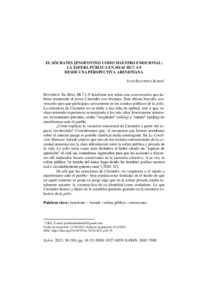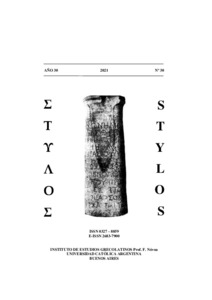Por favor, use este identificador para citar o enlazar este ítem:
https://repositorio.uca.edu.ar/handle/123456789/13389| Título: | El Sócrates jenofonteo como maestro emocional : la esfera pública en mem. III.7. 1-9 desde una perspectiva arendtiana | Autor: | Bardi, Juan Bautista | Palabras clave: | Jenofonte, ca. 430- ca. 355 a. C.; Arendt, Hannah, 1906-1975; VIDA PUBLICA; VIDA PRIVADA; CIUDADANOS; EMOCIONES; ANALISIS LITERARIO | Fecha de publicación: | 2021 | Editorial: | Pontificia Universidad Católica Argentina. Facultad de Filosofía y Letras. Instituto de estudios grecolatinos "Prof. F. Nóvoa" | Cita: | Bardi, J. B. El Sócrates jenofonteo como maestro emocional : la esfera pública en mem. III.7. 1-9 desde una perspectiva arendtiana [en línea]. Stylos. 2021, 30. doi: 10.46553/sty.30.30.2021.p18-35. Disponible en: https://repositorio.uca.edu.ar/handle/123456789/13389 | Resumen: | Resumen: En Mem. III.7.1-9 Jenofonte nos relata una conversación que ha-
brían mantenido el joven Cármides con Sócrates. Este último buscaba con-
vencerlo para que participara activamente en los asuntos políticos de la pólis.
La reticencia de Cármides no se debía a una falta de aptitud, sino a que, in-
cluso teniendo experiencia aconsejando a los más altos funcionarios atenien-
ses en reuniones privadas, sentía “vergüenza” (αἰδώς) y “miedo” (φόβος) de
manifestarse ante el pueblo. ¿Cómo explicar la variación emocional de Cármides a partir del espacio involucrado? Consideramos que, al incorporar una lectura arendtiana sobre el anterior pasaje es posible clarificar dicha interrogante. En La Condición Humana Arendt sostuvo que uno de los factores estructurantes de la sociedad ateniense era la clara delimitación entre la esfera pública y privada de la vida. La pólis tenía como nota distintiva el haber creado un “espacio de
aparición” al cual sus ciudadanos ingresaban para que las acciones y discursos
allí realizados fuesen conservados en la memoria colectiva. A su vez, la esfera pública “se trataba del único lugar donde los hombres podían mostrar real e invariablemente quienes eran” (2020: 52).
De allí que las emociones de Cármides –la vergüenza y el miedo a
manifestarse ante el pueblo– bien puedan estar fundadas en el hecho de que en aquel contexto se ponía en juego algo que en la esfera privada estaba totalmente ausente: la construcción de su identidad como ciudadano. Lo que Cármides hiciera y dijera en la asamblea quedaría grabado en la memoria colectiva de la pólis. Abstract: In Mem. III.7.1-9 Xenophon introduces a conversation held between the young Charmides and Socrates. The last one was trying to convince the first one to actively participate in the political affairs of the polis. The negative of Charmides was not rooted in a lack of capacities, since he had experience advising important Athenian officials in private meetings, but in the fact that he suffered from “shame” (αἰδώς) and “fear” (φόβος) of publicly showing himself to the mob. How can the emotional variation of Charmides in relation to the public space involved be explained? I consider that, if the philosophy of Hannah Arendt is incorporated to the interpretation of the previous passage, light can be shed over this question. Particularly in The Human Condition, she claimed that one of the main characteristics of Athenian democracy was the clear demarcation between the public and the private spheres of life. The polis had been capable of creating a “space of appearance” in which its citizens entered so as their actions and speeches there performed were kept in the collective memory. Furthermore, the public realm “was the only place where men could show who they really and inexchangeably were” (1998: 41). Therefore, Charmides emotions –the shame and fear of appearing in front of the mob– can be rooted in the fact a procedure took place in thar context which was totally absent in the private sphere: the construction of his civic identity as a citizen. What Charmides happened to do or say in the Assembly would become engraved in the collective memory of the polis. |
URI: | https://repositorio.uca.edu.ar/handle/123456789/13389 | ISSN: | 0327-8859 (impreso) 2683-7900 (online) |
Disciplina: | LITERATURA | DOI: | 10.46553/sty.30.30.2021.p18-35 | Derechos: | Acceso abierto | Fuente: | Stylos. 2021, 30 |
| Aparece en las colecciones: | STY - 2021 nro. 30 |
Ficheros en este ítem:
| Fichero | Descripción | Tamaño | Formato | |
|---|---|---|---|---|
| sócrates-jenofonteo-maestro-emocional.pdf | 391,16 kB | Adobe PDF |  Visualizar/Abrir | |
| stylos30_portada.pdf | 128,89 kB | Adobe PDF |  Visualizar/Abrir |
Visualizaciones de página(s)
73
comprobado en 27-abr-2024
Descarga(s)
117
comprobado en 27-abr-2024
Google ScholarTM
Ver en Google Scholar
Altmetric
Altmetric
Este ítem está sujeto a una Licencia Creative Commons

